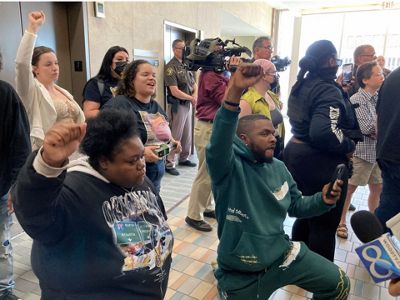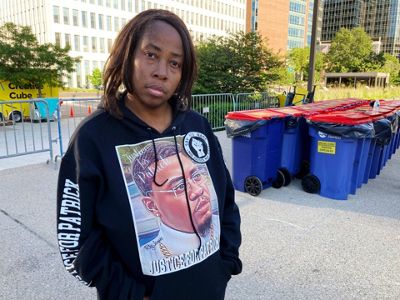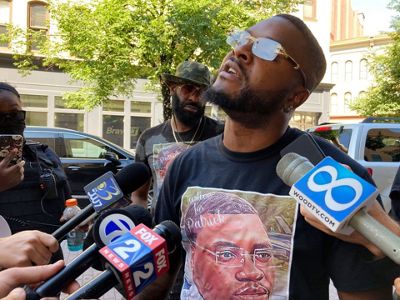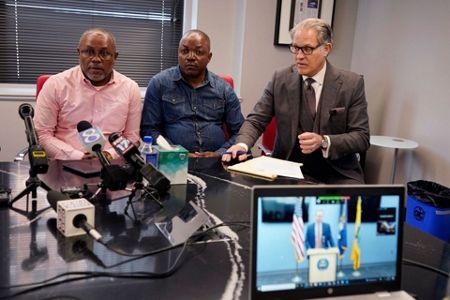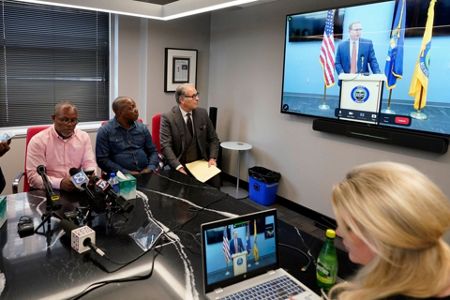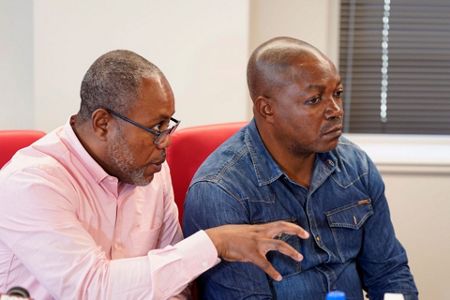GRAND RAPIDS, Mich. (AP) — Black civil rights activists in April demanded that a Michigan prosecutor stand aside in the investigation of the police officer who killed Patrick Lyoya with a shot to the back of the head, claiming he was too cozy with local law enforcement.
Chris Becker’s response: This is what I was elected to do.
Becker, a Republican, filed a second-degree murder charge Thursday against Grand Rapids Officer Christopher Schurr, whose fatal shot following a traffic stop on April 4 was recorded on a bystander’s phone. The announcement was praised by critics who for weeks had said that Michigan's Democratic attorney general should take over.
“I was shocked, to be quite honest. I was absolutely shocked. I didn’t expect that,” said Cle Jackson, president of the Greater Grand Rapids NAACP, who previously had said that an unbiased investigation by Becker’s office was not possible.
“We’re thankful for Chris having that fortitude to bring the charge that we feel comfortable with. Now we’ll have to continue to fight in the courts,” Jackson said.
Schurr, 31, was released from jail Friday after appearing in court by video. Bond was set at $100,000, and a not-guilty plea was entered on his behalf. Defense attorneys insist the officer feared for his safety when he shot Lyoya, 26, a refugee from Congo.
The courtroom benches were full of spectators, some wearing T-shirts with pro-police slogans, including #StandwithSchurr. As dozens of Schurr supporters departed, many embracing, they were met by pro-Lyoya demonstrators chanting, “Justice for Patrick!" The Schurr crowd said little. One white man tried to debate with the pro-Lyoya group but was quickly shouted down.
The practice of state prosecutors handling police shootings has become common, especially in tense, high-profile cases with diverging public opinion and perceptions that local authorities favor officers. In Minnesota, the attorney general’s office won convictions against Derek Chauvin in the death of George Floyd and Kim Potter in the fatal shooting of Daunte Wright.
Maine has long given its attorney general sole power in such cases. California requires the attorney general to investigate fatal police shootings of unarmed civilians. New York created a special unit within the attorney general’s office. Minnesota state prosecutors take cases upon request.
In Michigan, Becker could have asked Attorney General Dana Nessel to step in — an option for a prosecutor who has a conflict of interest or needs certain expertise — but he said it wasn’t necessary.
The son of a longtime local newspaper sports editor, Becker was elected Kent County prosecutor in 2016 after years as a trial lawyer in the same office.
He dismissed claims that he couldn’t fairly examine the acts of a police officer in Grand Rapids, the largest city in western Michigan with a population of roughly 200,000.
“We are our own entity,” he said Thursday. “We have a duty to enforce the law. We work a lot with them, but we don’t work for them.”
Local defense attorney Rick Zambon said earlier criticism of Becker was unfair.
“I’ve been dealing with him for 30 years,” Zambon said. “I’ve always found him to be a forthright, open-minded person. He doesn’t play politics. ... I don’t always agree with his charging decisions, but I can’t say they’re not without a lot of thought.”
Nessel, who repeatedly said she was willing to take the Lyoya case if asked, complimented the “exhaustive review” by state police and Becker’s office. Lyoya's family, too, said the second-degree murder charge fit.
Ven Johnson, a lawyer who is expected to file a lawsuit over the shooting, was scheduling media interviews this week with Lyoya's family to express anger over the pace of the investigation before Becker signaled that his decision was in.
“While the road to justice for Patrick and his family has just begun, this decision is a crucial step in the right direction,” co-counsel Ben Crump said.
After the charge was announced, protesters gathered outside City Hall and the Grand Rapids Police Department. Some weren't satisfied.
“I appreciate the second-degree murder, but to me it’s still like a slap in the face, to be honest, because I need first-degree,” said Jimmy Barwan, 25, of Grand Rapids. “Life without parole.”
Second-degree murder in Michigan can carry a maximum sentence of life in prison, but offenders typically get an opportunity for parole.
“A Black man would not get any chance of parole,” Jalauna Williams, 20, of Grand Rapids, said.
Becker was asked by a reporter if he was trying to send a message to police with the murder charge.
“I'm never big on sending messages with charges,” he replied. “I'm not thinking that Kent County officers or any police officers in general thought they had a license to go out and do something like this. This is not a message. This is just based on the facts.”
___
White reported from Detroit. Amy Forliti in Minneapolis contributed.
___
Find the AP’s full coverage of the fatal police shooting of Patrick Lyoya: https://apnews.com/hub/patrick-lyoya
Copyright 2022 The Associated Press. All rights reserved. This material may not be published, broadcast, rewritten or redistributed without permission.


